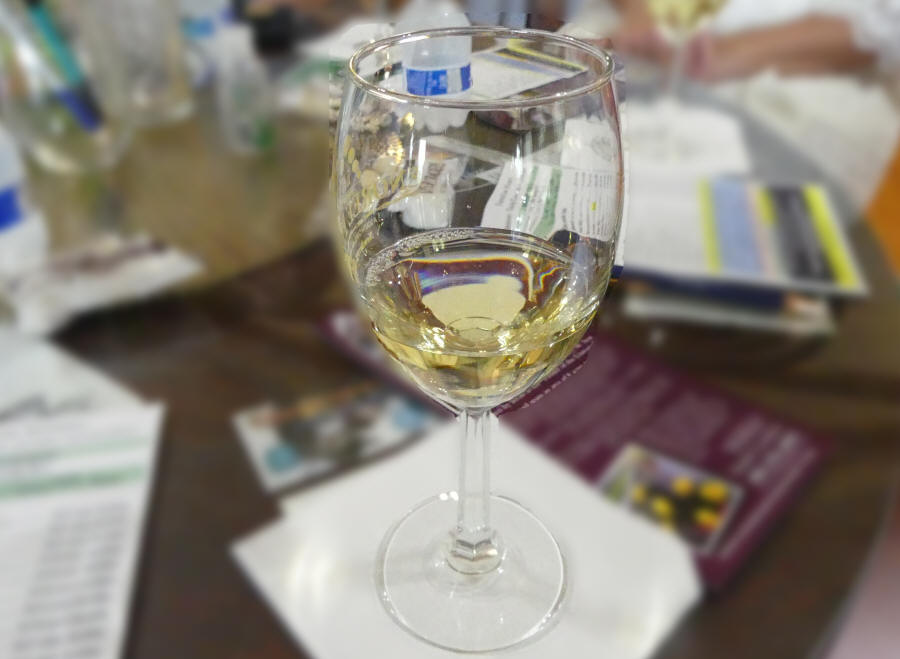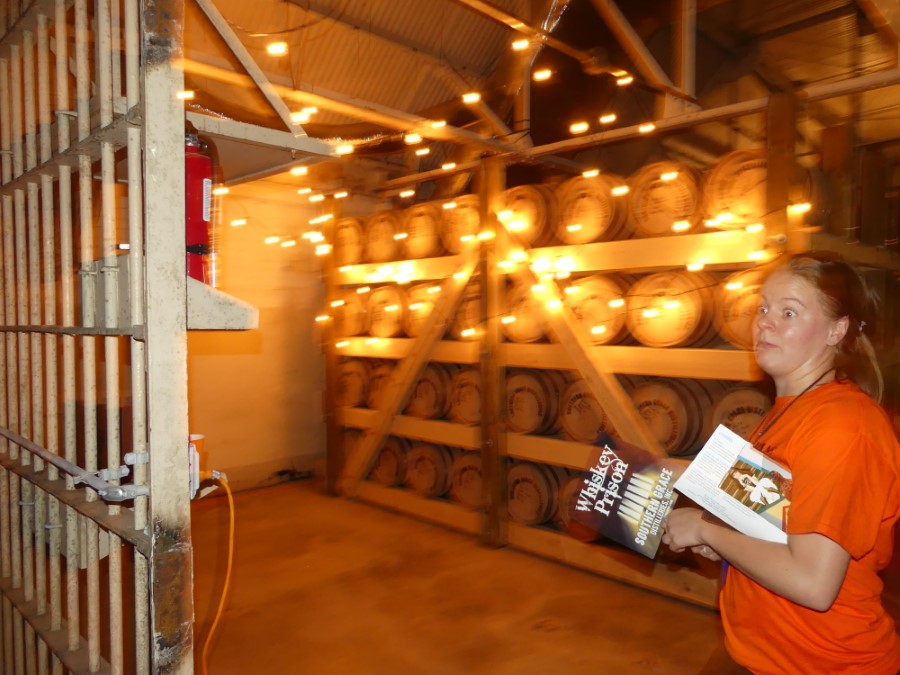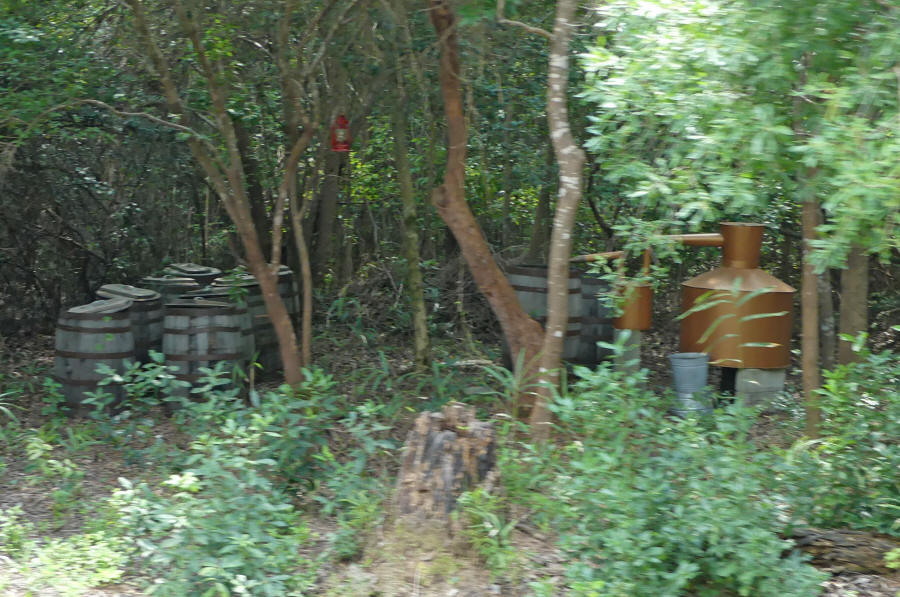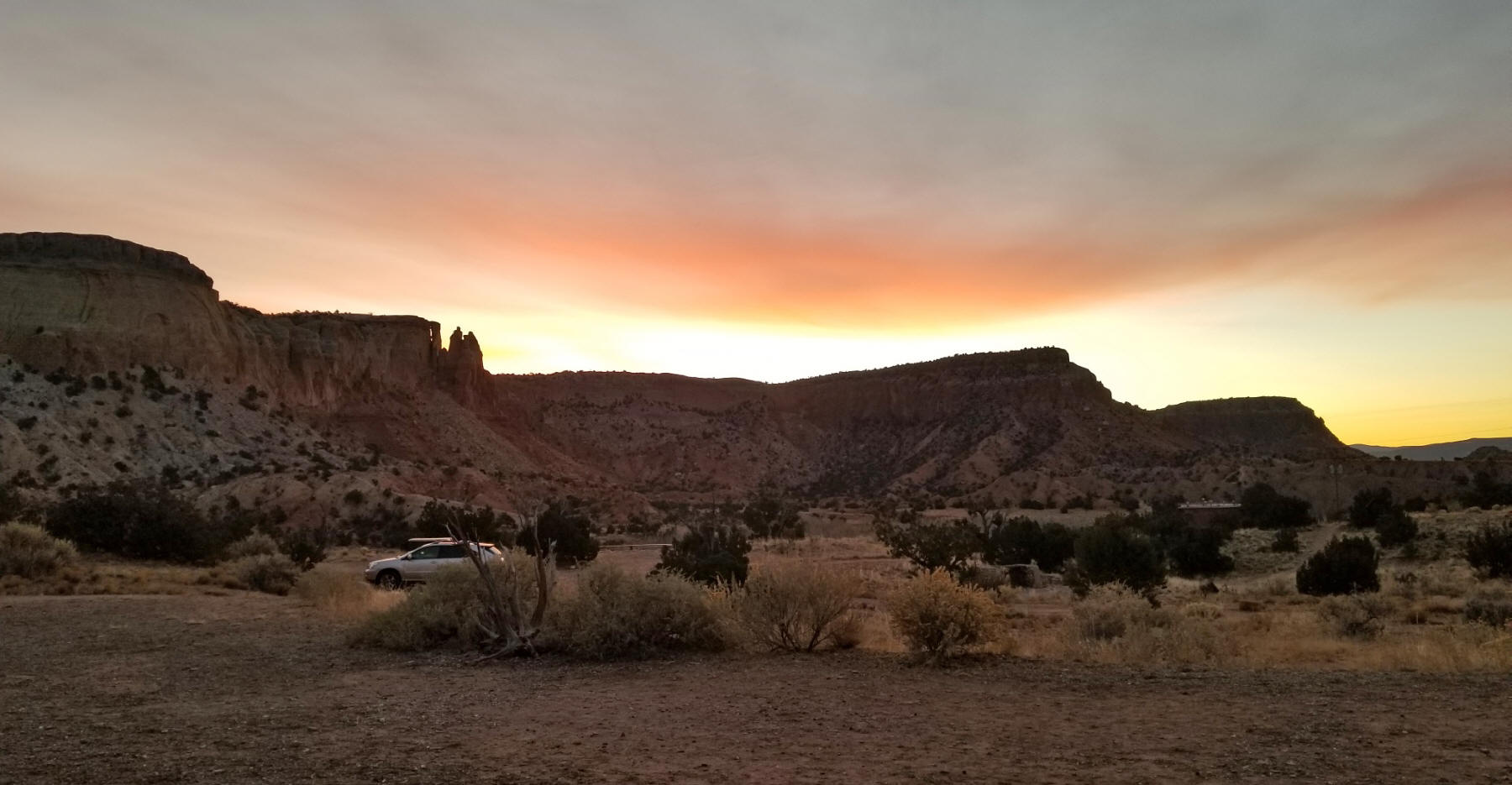Drink up!
Story and photos
by Kathleen Walls
Distilleries, wineries and breweries in
the Carolinas are great spots to visit on your next road
trip. They have some very unique ones. Here are a few
of my favorites.
South Carolina
Steel Hands Brewery
.JPG)
Steel Hands Brewery
in little Cayce, South Carolina, near the capital of
Columbia is an example of a brewery helping a town
revitalize. We met with Mayor Elise Partin at Steel Hands
Brewery taproom, where we had a fantastic lunch from wings
to pretzels and some tasty hamburgers. Their food menu is as
varied as their brews. Of course, we sampled a flight of
their beers.
.JPG)
Mayor Partin told us about using art to
revitalize Cayce. The brewery is doing its part with live
musical artists performing in their outdoor space regularly.
Even the brewery logo, a strong hand holding some steel
rebar, recognizes the hard-working people who work in local
industries like CMC Steel, one of the nation's largest rebar
manufacturing plants, just across the street from the
brewery.
.JPG)
They support the community in other
ways, too. Their Folds of Honor Lime Lager honors Palmetto
State's fallen, disabled service members and their families,
and first responders who deserve respect. Part of the sales
of this product benefits Folds of Honor of Palmetto State.
Their Steel Paws Wheat Ale aids local canine projects.
Enoree River Winery and Vineyard
.JPG)
Enoree River
Winery and Vineyard in Newberry offers guest a chance to
taste wines made with locally grown grapes. Richard and
Laura LaBarre and their family began the winery in 2006 when
they planted 8 acres with Carlos and Noble Muscadines. In
2009, thanks to their acceptance by the community and
visitors, they planted Herbemont and Lenoir grapevines.

They have an outdoor patio overlooking
the beautiful vineyards, but when we visited, it was too hot
to enjoy the view. We settled in the comfortable tasting
room and enjoyed a tasting of 11 of their wines.
.JPG)
They host an annual fall Newberry
Harvest Festival and various events throughout the year,
including live music and karaoke.
The winery is pet friendly and welcomes
well-behaved dogs on the porch or grounds. There is a
resident cat, but she didn't come out to meet me, cats being
pretty independent.
Newgrass Brewing Company
.JPG)
Newgrass Brewing Company is
Shelby's first craft brewery.
The brewery in a renovated Hudson's Department Store
dating from 1946 to 1948 with a fantastic Earl Scruggs mural
on the outside wall. The wood inside the brewery was
reclaimed from the old Dover Mill, at one time the largest
employer in Cleveland County. Shelby is the home of Scruggs
and has the Earl Scruggs Center you do not want to miss when
you are there.
.JPG)
Besides their craft beer, they make a
tasty hard-seltzer. Guava Colada, a delicious hard seltzer
made with guava, pineapple, and coconut cream, is my
favorite.
They serve some delicious bar food to
go with their brews. Lots of burgers, and chicken, both
Nashville hot and not. One unique item you need to try is
livermush. I hesitate to call it a delicacy, but it is a
regional food common to Western North Carolina made of pig
liver, parts of pig heads, cornmeal and spices. This is made
into a loaf, then sliced and fried. It's manufactured mainly
in Shelby. It is believed to originate with the German
settlers moving into the Appalachian in the 1700s. I tried
it and it is pretty good, a bit like fried liver cheese.
North Carolina
Baker Buffalo Creek Vineyard
.JPG)
Baker Buffalo Creek
Vineyard and Winery, just across the state line from
Shelby in Lawndale, North Carolina, is a friendly
family-owned winery. We met Ann and Charles Edwards, the
owners, who began producing wine in 2003 after visiting
California wine country. The century-old farmhouse,
beautifully restored mule barn, and the original milk house
where they produce the wine and the tasting facility, has
been in the Baker family for over 100 years.
.JPG)
It's in a beautiful rural setting, and
the wine is delicious. They create many of the traditional
wines, like Cabernet Sauvignon and Riesling, but experiment
with new versions. BE Baker, a brandy barrel-aged merlot
with a hint of brandy flavor, is their latest. Ann gave me a
tasting of a red, white, and rose.
.JPG)
You can bring your pet along. It's pet
friendly and you may meet one of the family dogs. Do check
out the event center; it is precious.
Broad Ranch Distillery
.JPG)
Broad Ranch
Distillery in Winston Salem was the dream come true of
John Fragakis. Frafakia and his friend Nick Doumas spent
years planning the distillery and in 2014, their dream came
true when they opened Broad Branch Distillery in Big Winston
Warehouse, an old tobacco warehouse, on historic Trade
Street. It's an area of entrepreneurs–restaurants, bars,
music venues, and the downtown Arts District.
.JPG)
Doumas died in 2016 and Frafakia's
health deteriorated, so he brought in his daughters, Anna
Windham and Natalie Spinosa, to run the business.
They are doing great as the distillery
was featured on an episode of Discovery Channel's
Moonshiners: Whiskey Business in 2019. Broad Branch
follows old time Appalachian moonshiner traditions. They buy
non-gmo heirloom whole grain from local farmers and growers
and distill using the recipes passed down through
generations of moonshiners.
Fiddlin' Fish Brewing Company
.JPG)
Fiddlin' Fish Brewing Company is just down Trade Street
from Broad Ranch. It shares some of the traditional
Appalachian traditions. It was founded by Stuart and Lindsay
Barnhart, and Stuart's cousin, David Ashe. The cousins grew
up spending their summers in the Blue Ridge Mountains and
have a love of the outdoors, hiking the woods, and paddling
the creeks, combined with a love of old-time mountain music,
thus the name, Fiddlin' Fish.
.JPG)
They have a 15-barrel brewhouse and
produce traditional styles and an ever-changing cast of
seasonal experiments.
Outer Banks Distilling
.JPG)
Outer Banks
Distilling, the distillers of Kill Devil Rum in the
Outer Banks city of Manteo, carries on a long tradition in
the Outer Banks. Rum, as a pirate's favorite drink, was
always popular there, but Kill Devil Rum is the first
distillery to produce it legally. They opened in 2015.
We took a tour of the distillery with
Scott Smith, one of the four owners. He explained the name
because rum was once believed to be "strong enough to kill
the devil."
.jpg)
They offer tours and tastings during
the week, and tell how they begin with molasses, and
depending on the rum they are producing, go from there.
Their motto is "From molasses to glasses." They make their
rum completely from scratch in a custom-made 300L—9 plate
rectifying column, copper still from Germany.
.JPG)
I'm a big rum fan, so when Scott
invited us into the tasting room to sample some products, I
was thrilled. The bar is spacious and well-lit and there are
artifacts from local shipwrecks, including a ship's wheel
from the wreck of the Irma in 1925 and many other items. I
loved getting a taste of local history along with the rum!
My favorite was the Rum with Pecans and Honey since I am a
fan of sweet drinks. Of course, there are lots of other
choices to suit any taste.
Southern Grace Distilleries
Southern Grace Distilleries at Mt. Pleasant Prison is
the first distillery in the US to be located in a former
prison.
.JPG)
Leanne Powell was a Southern girl who
had a bootlegger grandfather. She lived up to her heritage
by heading up a unique concept at Southern Grace Distillery,
AKA Whiskey Prison, at Mount Pleasant, North Carolina.
Before Powell became president and co-founder of Southern
Grace, she had the most unlikely job imaginable for a
moonshiner; she was North Carolina Congressman Larry
Kissell's chief-of-staff.
Powell and her co-founder began the
process in January 2014. Despite her heritage, Powell wasn't
a distiller and didn't have a family recipe. What she had
was the desire to have a product that would be "made in
America." She started with the idea of eventually producing
bourbon, which they did. In November 2017 they released
Conviction. She passed away in July 2019, but her
co-founder, Thomas Thacker, is carrying on the tradition.
I had the good fortune to meet Ms.
Powell before her death and she told me, "Bourbon is one of
the few things that, to be bourbon, has to be made in the
U.S.A. so small-batch bourbon that was made and aged in here
in North Carolina was our aim." The name choice was based on
the fact they aged the whiskey carefully, so "Southern Grace
just seemed to fit."
.JPG)
The distiller is Sebastian Correa, a
graduate of Appalachian State University with a degree in
Fermentation Science. Besides his distilling skill, Southern
Grace depends on an unusual action to help the aging
process; they blast it with very loud rock music. Besides
bourbon, they make several corn whiskies.

Another unique fact about Southern
Grace's spirits is that besides their usual tours on
Wednesday through Sunday at 12:30, 2:00, and 3:30, they
offer night time paranormal tours. After all, this was a
prison in the early 1900s.
Deep River Brewery
.JPG)
Deep River Brewery
in Clayton is Johnson County's first legal brewery. Paul and
Lynn Auclair opened the brewery in April 2013 in a 1902
cotton spinning mill building. The wall in the taproom is
made from an old tobacco barn built in 1949. It's a hop in
the right direction. Most of their beers include locally
sourced vegetables, fruits, hops, and grain. They named the
brewery for the Deep River in the Adirondack area near where
Paul grew up. They're open daily except Mondays, and bring
in food trucks and music most nights.
.JPG)
Two things make their beer remarkable.
First, and least important, I rarely find a beer I enjoy. I
have a love/hate relationship with most hops. I think
they're beautiful plants, but I don't like their bitter
taste. I was delighted to find Double D's Watermelon Lager,
one of their seasonal beers, tasted delicious. If I liked
it, anyone who doesn't like hops, whether they are a beer
drinker or not, will enjoy the sweet watermelon taste of
this beer. Yes, it has real local watermelons infused into
it. Secondly, several years ago, N.C. University
discovered/created the first new yeast in 600 years capable
of making a good sour beer. Nicknamed Bumblebeer, these are
a new type of beer that's a cross between a sour beer and
ale. Deep River Brewing was the first brewery to make beer
from bumblebeer yeast. They now make four beers from it. One
is Limoncello, an ale that looks and tastes like the freshly
squeezed lemonade that is part of the concoction.
.JPG)
I noticed their cute delivery truck and
asked about it. They do their own distribution since under
present law, if a brewery produces less than 50,000 barrels
of beer annually, they can do their own distribution. A
deliveryman for Deep River proudly showed off the Deep River
Truck.
Hinnant Family Vineyards & Winery
.JPG)
Hinnant Family
Vineyards & Winery has been a North Carolina tradition
in Pine Level since 1972. Like excellent wines, Hinnant
Family Vineyards are well aged.
Its story began in 1971 when Hinnant
siblings, Jacqueline, Freddie, Douglas, and Willard decided
to plant a vineyard in Johnston County. Tobacco had been the
main crop in the area, and it was fast becoming
unprofitable. Those first batches of grapes were sold to
markets, the public and later other wineries.
Things took a different turn in 2003.
Williard and his son, Bob, decided to start producing their
own wine and the vineyard now became Hinnant Family
Vineyards & Winery. They bought out their siblings,
eventually. After Williard passed away in 2013, Bob expanded
farther. Today, he has about 100 acres of grapes and sells
some to other local wineries. The Hinnant Family Vineyards &
Winery is the oldest and largest commercial Muscadine
vineyard in the state of North Carolina. Some vines are 45
to 46 years old.
.JPG)
Bob is totally involved in both the
growing and the wine processing. Everything is done onsite
from picking to crushing, juicing, and bottling to the
winemaking. Everything is grown on site or locally.
Norton is a Virginia native grape grown
at Hinnant. It takes up approximately 2 acres in their
vineyard. One
variety, American hybrid Blanc du Bois needs to be harvested
by hand so they only grow a few acres of it. Even so it
takes about a month. The rest of the 100 acres takes only
about 6 to 8 weeks to harvest. My favoriet her and their
bestselling white wine is a Carlos Sweet Muscadine.
.JPG)
Aside from traditional wine, Hinnant
produces fruit wines. My favorite of these is a blackberry
wine made from Johnson County blackberries. Their other
fruit wines include strawberry and blueberry.
Their Carolina Wildflower, made from
Carlos Grape and sweetened with wildflower honey, won Best
of Show and Best of Muscadine Cup at North Carolina State
Fair in 2014. This was the first time a Muscadine wine ever
won Best of Show. They beat out 437 entries.
They offer tours and have a small
choice of foods available.
Gregory Vineyards
.JPG)
Gregory Vineyards
in Angier is a picturesque 140-acre family farm that now
showcases hills of planted vineyards, a winery, and a
tasting room where you can sip on double gold winning Mary
Elizabeth and Lee Love wines. They now produce seven
varieties of unfortified wine and three brandy wines.
.JPG)
The
interesting thing about Muscadine grapes is that they only
grow in the southeastern states. The Muscadine grape
produces a wine that tastes like you went out and picked a
grape and popped it in your mouth. Muscadine family consists
of over 350 varieties. Scuppernong is a bronze variety of
Muscadine that was discovered along the Scuppernong River in
North Carolina. The original mother vine is still alive on
Roanoke Island, where it has been growing and producing for
about four hundred years. Noble is the most common type of
Muscadine used for wine.
The Gregorys began with Lane's Seafood
and Steakhouse on Feb 7, 1987, and in 2009, opened Gregory
Vineyards under the care of winemaker Lane Gregory. They
offer catered picnics on the farm grounds.
.JPG)
Broadslab Distillery
.JPG)
Broadslab
Distillery in Benson is North Carolina's 1st "farm"
distillery on land that had been in the family for many
generations. Jeremy Norris is another moonshiner who turned
an old family recipe for moonshine into modern-day whiskey.
Johnson County, where Broadslab is located, was once the
state's biggest illegal moonshine area. Jeremy not only is
using his grandfather, Leonard A. Wood's, recipes; Broadslab
Distillery is on the same land where his grandfather once
built his stills.
Norris was raised by his grandfather.
They had a roadside produce stand which was pretty
sustainable before the interstate. They spent a lot of time
together and that was how Morris learned his family history.
He told me, "My grandfather told me his grandfather bought
this land, about 400 acres, back in the 1840s. They were
farmers but also made whiskey. His granddaddy used to make
whiskey here and put it on wagons and carry it down to the
Cape Fear River and export it downriver."

Norris's grandfather, who was born in
1923, carried on the tradition. Norris said, "He used to
tell me he had a doctor's degree in bootlegging. He ran a
still with his brother when he was around five. He started
running his own still at age 13 and got married at 19. In
the 1950s, federal agents decided he needed to retire his
bootlegging operation."
In
1990, when they opened up I-40, Norris was about 14 years
old. That dried up their produce business. His granddaddy
kept telling him, "I'm too old to do it, but you ought to
open a moonshine museum. It would bring people back out here
to the farm."
Norris never believed he would do
anything like that. Then in 2005 he got the opportunity to
buy back 60 acres of the original farm that were sold off
over the years. First, he tried small farming and found it
wasn't working. About that same time, North Carolina
licensed its first craft distillery. They advertised
handcrafted North Carolina moonshine. He tried a bottle, and
it didn't taste like what he thought of as North Carolina
moonshine. He found out the distillery was using a product
bought in bulk. He shook his head, "They just bottled and
slapped a label on it." He felt, "That seemed kinda' wrong.
It would be nice if someone from North Carolina would put an
authentic, handcrafted product on the shelf to offer to the
consumer."
That someone turned out to be Norris
himself. In 2007, he decided to use the land to a distillery
and grow his own grain and non-gmo corn. With the help of
his grandfather, it took four years to put it all in
operation. He had no partners or investors. He pointed to
the copper still, "My grandfather helped design the still,
and we had it built by a local welding shop. In November
2011, Broadslab Distillery became the fifth licensed
distillery in North Carolina. The first product came out in
August 2012."
.JPG)
His grandfather passed away before the
first product hit the marketplace, but his legacy lives on.
On the way from the gift shop, his grandfather's former
home, to the distillery, Norris pointed out a tiny still
with a few barrels just visible from the road. That was
where his grandfather had a still. Throughout the property,
there are numerous artifacts dating back to the heyday of
moonshining like an old truck with a small still and some
antique farm implements. Norris's corn whiskies are named
Legacy Shine, Legacy Reserve, and Legacy Appleshine in his
honor. The recipes were his grandfather's. Morris said he
asked his grandfather, "What'a you think I should make?"
He recalls his grandfather told him,
"'I used to make two different kinds of liquor.' He made one
to sell and one to drink. The one to drink took a lot of
time and trouble, so he only made small batches. You had to
soak the corn for a few days to let it swell up, then you
had to wrap it in burlap sacks until it germinated, then
they would spread it on a piece of tin in the sun to dry."
He explained he adapted his
grandfather's method to fit a modern distillery. "Instead of
a few buckets, I make about 1000 pounds at a time. I use a
tobacco barn as a malt house. I soak corn in 55 gallon
barrels before I pour it out and I keep it damp in that barn
and let it germinate, then turn the fans and heat on and let
it dry. It takes about 12 hours. Then we shovel it into the
building and run it through the mill. Pound by pound it's
the same mash; just bigger batches. It's malted corn and
malted barley. We mix the ingredients together, get the
temperature right, add the yeast, then we let it ferment for
about eight or ten days. Once the fermentation is complete,
we pump the beer into the still and that's what we distill."
In addition to the three kinds of
whiskey: bourbon, corn whisky, and rye whiskey, Broadslab
produces two kinds of rum, spiced and silver.
Mother Earth Brewery and Mother Earth Spirits
.JPG)
Mother Earth
Brewery in Kinston opened in 2009. As its name implies,
it's the greenest brewery I ever visited. Co-owner, Stephen
Hill, is passionate about being kind to Mother Earth. He has
several projects in Kinston, all involving revitalizing old
buildings. So it's only natural that when he started
planning for a brewery and distillery, it would be in a
renewed building.
.JPG)
The building he found had been a
drive-through pharmacy. Today, it's a state-of-the-art Leeds
Gold Certified building. The second highest possible award
for a company and the highest ever awarded a brewery. He
kept about 95% of the building's original material in the
brewery.
Other things are equally important like
none of the used grain is wasted. The byproducts are sent to
a local farm to feed the animals. Jeff told us "We were the
first brewery in-- I believe the world—to use a 100 Gycol
cooling system. The story was the company Stephen was
looking at for coolers had an experimental model Gycol
system but they said 'It'll be about a year before it is
ready but if you want to be a guinea pig we'll do everything
to make it work.' Stephen went for it making us the first
brewery to use the environmentally friendly system."

The bottle labels are painted by a
local artist. Many of the pictures are very personal to
Mother Earth Brewery. One label, Sisters of the Moon an
India Pale Ale, was painted from a photograph of co-owner,
Stephen Hill's three daughters dancing around a fire in the
moonlight. Trent Mooring, co-owner, is married to one of
Stephen's daughters, keeping it all in the family.
Stephen did his one and only art project, a painting that
took him several weeks compared to others who completed
their art in hours. It hangs in the taproom.
The facility was spotless as our guide
led up through the brewing area to canned and bottled. They
produce six year-round beers and another six or seven
seasonal varieties.
When you step out of the large taproom
to the patio seating, you still see the green influence all
around. There is a garden growing seasonal vegetables. Above
the back of the patio, there is a large set of solar panels
that produce enough power to run the entire operation.
Tours run Tues-Fri 10am to 5pm and
Saturday 1pm-8pm on the hour.
Mother Earth Spirits, founded in 2008
by Stephen Hill and Trent Mooring, was in the process of
being moved to its own facility, so we didn't get a tour of
it. In 2004, it won several awards from SIP Awards,
showcasing their excellence in craft spirits; Mother Earth
Carolina Rye Whiskey received Double Gold in the American
Rye Malt Whiskey category, Mother Earth Spirits American
Botanical Gin won a Gold medal along with the coveted
Consumers' Choice Award, Mother Earth Spirits Carolina Dry
Gin earned a Double Gold and also claimed the Consumers'
Choice Award, and Mother Earth Spirits American Single Malt
Whiskey earned a Gold medal, the Consumers' Choice Award,
and an Innovation Award for outstanding quality and
uniqueness. Pretty impressive results.
Public Disclosure
Please Read
FTC has a law
requiring web sites to let their readers know if any of the
stories are "sponsored" or compensated. We also are to
let readers know if any of our links are ads. Most are not.
They are just a way to direct you to more information
about the article where the link is placed. We have several ads
on our pages. They are clearly marked as ads. I think
readers are smart enough to know an ad when they see one but to
obey the letter of the law, I am putting this statement here to
make sure everyone understands. American Roads and Global
Highways may contain affiliate links or ads. Further, as their
bios show, most of the feature writers are professional travel
writers. As such we are frequently invited on press trips, also
called fam trips. On these trips most of our lodging, dining,
admissions fees and often plane fare are covered by the city or
firm hosting the trip. It is an opportunity to visit places we
might not otherwise be able to visit. However, no one tells us
what to write about those places. All opinions are 100% those
of the author of that feature column.



